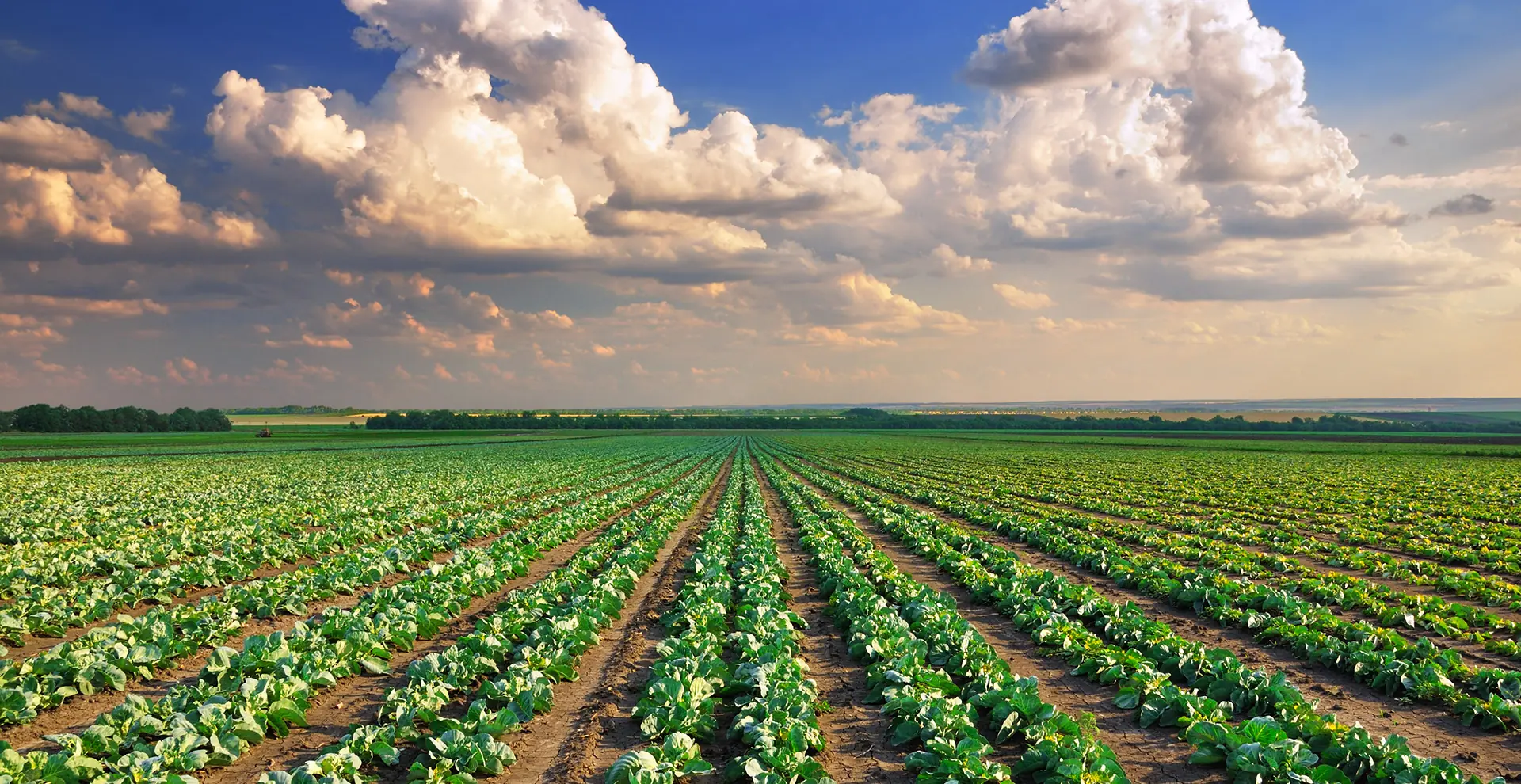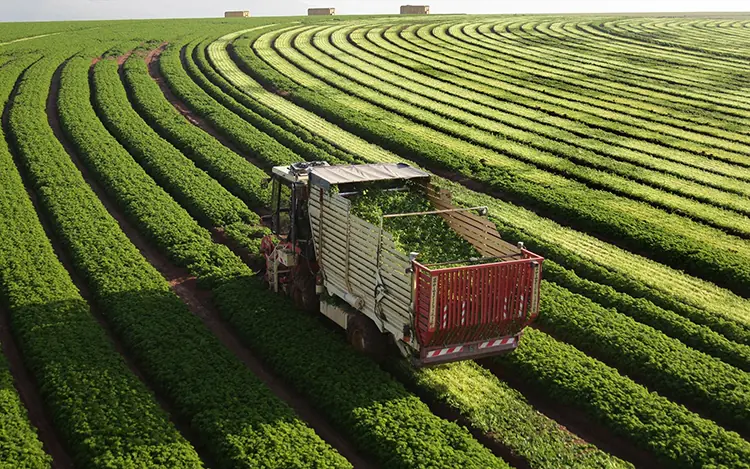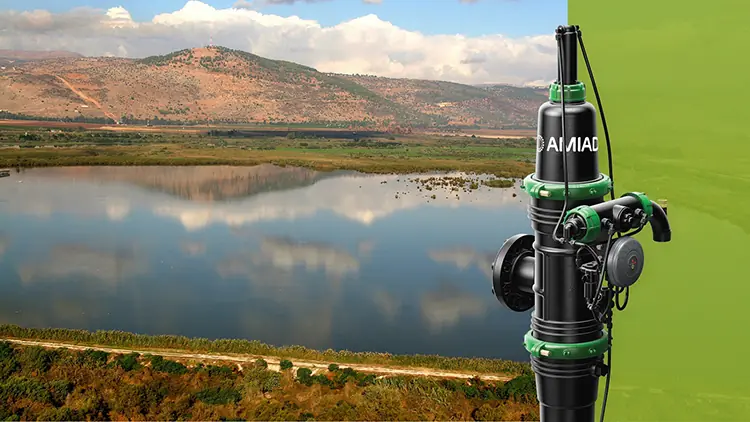With the ever-growing global population and the strain on natural resources, precision irrigation has a huge effect on agriculture. This targeted delivery minimizes water waste due to evaporation or runoff, allowing farmers to maximize crop yields while using less water.
By combining precision irrigation with efficient filtration, farmers can embrace a sustainable and productive future for agriculture.
What is precision irrigation?
Precision irrigation delivers water to crops through a network of pipes, sprinklers and emitters, exactly where and when it’s required, so that each and every plant gets what it needs to thrive.
There are various types of precision irrigation (read about them in this blogpost), each requiring irrigation water filtration to keep the emitters clean and functioning without clogging.
The importance and benefits of precision irrigation
By delivering water directly to roots, precision irrigation offers a multitude of benefits that go beyond improved water efficiency and higher crop yields. Let’s dive into more detail:
- Optimal Growth: By delivering water directly to the roots, where it’s most beneficial, plants have better access to moisture. This translates to enhanced root development, improved nutrient uptake, and overall healthier plant growth.
- Reduced Disease Risk: Overwatering creates a breeding ground for fungal diseases. Precision irrigation prevents waterlogging, creating a healthier environment for roots and reducing the risk of outbreaks that can devastate yields.
- Reduced Fertilizer Waste: Fertilizers can be integrated directly into the irrigation water (fertigation). Precise delivery ensures nutrients reach the root zone directly, minimizing waste and maximizing their effectiveness.
- Labor Savings: Precision irrigation systems can be automated, requiring less manual labor for operation and adjustments. This allows farmers to focus on other aspects of their crops, improving overall farm management efficiency.
- Environmental Benefits: By minimizing water waste and reducing reliance on chemical fertilizers and herbicides, precision irrigation contributes to a more sustainable agricultural future.
The significance of efficient filtration in precision irrigation
One of the most critical factors that determine the success of precision irrigation is filtration. The tiny emitters are extremely susceptible to clogging from impurities like minerals, sediment, and organic debris present in water sources. Clogged emitters disrupt the even distribution of water, jeopardizing plant health and potentially leading to yield reduction.
The function of filtration in irrigation systems
Filtration systems act as the first line of defense of precision irrigation, removing harmful particles from the water supply before they reach the emitters. Clean, filtered water ensures consistent flow to plant roots, allowing farmers to precisely deliver the right amount of water at the right time. This leads to optimal crop growth, improved water use efficiency, and ultimately, bigger, healthier harvests.
The choice of filtration method depends on the specific water source and its contaminants. Common filtration options include screen, disc and media filters each offering varying levels of filtration and automation.
Common contaminants in irrigation water and their impact on crop health and yield
Water can contain a variety of contaminants that damage crop health and yield. Here’s a breakdown of some common culprits and their effects:
- Sediment and Sand: The most common offenders. They can clog emitters, disrupting the even flow of water and causing uneven watering. This can lead to stunted growth and potentially reduced yields.
- Organic Matter: While organic matter can be beneficial in some cases, excessive amounts can clog emitters and promote microbial growth within the irrigation system. This microbial growth can lead to biofilms forming on emitters and pipes, further restricting water flow and potentially containing harmful pathogens.
- Salts: High salt levels in irrigation water can lead to a condition called soil salinity. This occurs when salts accumulate in the soil, drawing water away from plant roots through a process called osmosis. This can cause wilting, stunted growth, and ultimately, crop failure.
- Chemical Contaminants: These can include fertilizers, herbicides, or other agricultural chemicals that may have leached into the water source. High concentrations can damage plant tissues, disrupt nutrient uptake, and lead to reduced yields or even crop death.
- Microbial Contaminants: Bacteria, fungi, and even algae can be present in water sources. While some bacteria may be beneficial, harmful pathogens can enter the irrigation system and directly infect plants through the roots. This can cause various diseases, leading to significant yield losses.
The impact of these contaminants varies depending on the specific type, concentration, and crop sensitivity. However, by understanding these potential threats, farmers can implement proper filtration strategies and water quality monitoring to safeguard their crops and maximize their yields.
Amiad’s tailored solutions for precision irrigation and sustainable filtration technologies
Filtration is the first critical link in the irrigation chain, protecting irrigation systems from clogging and providing high-quality water to crops.
We’ve dedicated over 60 years of mastering filtration solutions so that we can provide a variety of filters to meet every farmer’s needs including screen, disc or media technology:
SUCTION-SCANNING SCREEN
Combines a focused flush with suction scanner automation to provide self-cleaning of a multi-layered stainless-steel screen to ensure high efficiency filtration.
SPIN KLINTM DISC
Polymeric grooved discs providing depth filtration with high dirt holding capacity and consistent filtration results, with superior retention of organic matter.
MEDIA
Available with a wide range of media types – sand, glass, active carbon, anthracite, basalt, etc. – and various tank construction materials, meeting international drinking water standards.
Our irrigation water filtration systems and technologies help farmers all over the world conserve water and save time, energy and costs.
Read our case study to learn how our automatic self-cleaning filters helped save precious resources at this banana plantation.
Maximizing yield through smart water management
Importance of water management in agriculture
Efficient water management in agriculture is not just about saving water; it’s about maximizing crop yield and ensuring a sustainable future for our food systems. Here’s why:
- Precise Delivery: Efficient water management, through techniques like drip irrigation, delivers water directly to the root zone, minimizing waste and ensuring every drop reaches the plant where it can contribute to growth. It also prevents overwatering and underwatering which can both be detrimental to crops.
- Nutrient Optimization: Efficient water management ensures optimal soil moisture levels, facilitating the delivery of nutrients to the roots where they are readily absorbed by the plant.
- Water Conservation: Freshwater is a precious resource, and agriculture is one of the largest water users globally. Efficient water management practices, including rainwater harvesting, significantly reduce water demand, helping to conserve for future generations.
- Reduced Environmental Impact: Excessive water use in agriculture can lead to salinization, soil erosion, and pollution of water bodies with agricultural runoff.
- Climate Resilience: Climate change is expected to bring more extreme weather events, including droughts. Efficient water management practices equip farmers with tools to cope with water scarcity, making agriculture more resilient to a changing climate.
Precision Irrigation Solutions for Compliance and Sustainable Water Management
As water resources become ever more precious, regulations are evolving to promote responsible water use in agriculture. With quality water filtration, precision irrigation solutions enable precise water distribution, efficient usage, and improved water quality management, aligning perfectly with regulatory requirements for conservation and environmental protection.
By promoting efficient water use, precise distribution, and water quality management, Amiad’s technologies and irrigation filtration solutions help farmers achieve more sustainable agriculture, ensuring both regulatory compliance and a healthy future for our environment.
Summary
This article explores how precision irrigation, paired with Amiad’s filtration solutions, empowers farmers to achieve maximum yield while using water responsibly.
Precision irrigation delivers irrigation water directly to plant roots, boosting yield, disease resistance, and sustainability, and irrigation water relies on filtration to ensure that each and every plant gets the water it needs to thrive.
Using water wisely benefits everyone: maximum yield, reduced plant stress, and nutrient optimization. Efficient water management is crucial for water conservation, reduced environmental impact, and climate resilience.
With over 60 years of experience, Amiad offers a variety of filtration solutions. Amiad’s technologies help farmers comply with regulations and promote sustainable practices through precise water distribution, efficient water usage, and improved water quality management.
FAQs
How does precision irrigation enhance crop yields?
By delivering water directly to the plant roots, precision irrigation enables enhanced root development, improved nutrient uptake, and overall healthier plant growth.
Which contaminants are contained in irrigation water impact crop health?
The most common contaminants are sediment and sand. Additionally, excessive organic matter can clog emitters and promote microbial growth, high salt levels can lead to higher than usual soil salinity and high chemical concentrations can lead to reduced yields and even crop death.
Why is filtration crucial for precision irrigation systems?
Filtration to prevent clogged emitters is essential for the uniform distribution of irrigation water and ensures high production quality and profitable yield.







